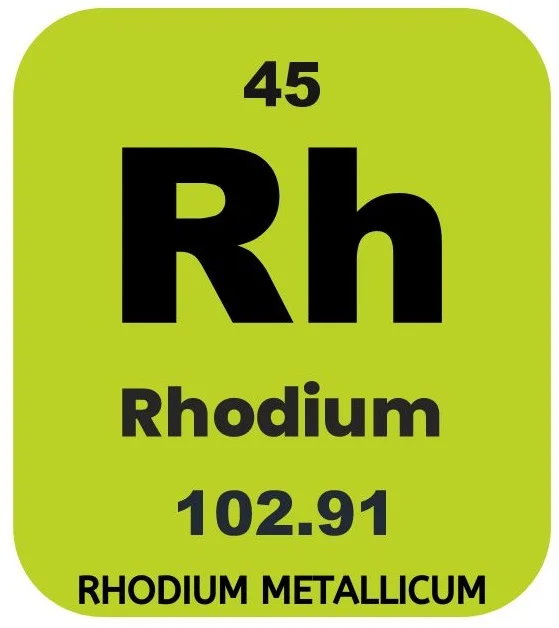Rhodium Metallicum, derived from the metal rhodium, is a homeopathic remedy used for a variety of symptoms, primarily related to the nervous system, head, and gastrointestinal tract.
It is known for addressing conditions involving fleeting neuralgic pains and general weakness.

Table of Contents
ToggleSOURCE INFORMATION
- Metal Chemical Element (RHODIUM)
- Proved by MacFarlan with the 200th potency.
Scientific Classification
- Element: Rhodium
- Symbol: Rh
- Atomic Number: 45
- Group: 9
- Period: 5
- Block: d-block
- Category: Transition Metal
Origin
- Rhodium is a rare, silver-white metallic element discovered by William Hyde Wollaston in 1803.
- It is typically found in platinum or nickel ores and is one of the rarest and most valuable precious metals.
- Rhodium is often used in catalytic converters in cars, jewelry, and for its reflective properties in mirrors and searchlights.
Historical Facts
- The name “rhodium” comes from the Greek word “rhodon,” meaning “rose,” due to the rose-colored appearance of some of its compounds.
- It was first isolated by Wollaston shortly after he discovered palladium.
- Rhodium’s rarity and reflective properties have made it highly valuable in various industrial applications.
DRUG PATHOGENESIS
- Rhodium Metallicum has a pronounced effect on the nervous system, causing nervousness, tearfulness, and various types of headaches.
- It also impacts the gastrointestinal system, causing symptoms like nausea, loose stools, and increased urine production.
- Musculoskeletal complaints, such as stiffness and rheumatic pains, are also noted.
KEY CHARACTERISTICS
- Nervousness and tearfulness
- Frontal headaches and neuralgic pains
- Nausea, especially from sweets
- Loose stools with abdominal griping
- Increased urinary output
- Weakness, dizziness, and tiredness
DETAILED ORGAN SYMPTOMS
MIND
- Nervous and tearful: The individual feels overly emotional and easily brought to tears.
HEAD
- Frontal headache: Persistent pain in the front part of the head.
- Shocks through the head: Sudden, sharp pains felt throughout the head.
- Neuralgic pains: Fleeting, sharp pains in the head, over the eyes, in the ears, and on both sides of the nose.
- Dull headache: A constant, low-grade headache that affects concentration and overall well-being.
MOUTH
- Dry lips: Lips feel parched and may crack easily.
STOMACH
- Nausea from sweets: Consuming sweet foods triggers a feeling of nausea.
NECK AND SHOULDERS
- Stiff neck: Limited movement and discomfort in the neck area.
- Rheumatic pain: Pain that extends down the left shoulder and arm, often related to inflammation or arthritis.
SKIN
- Itching: Sensations of itchiness in the arms, palms, and face.
GASTROINTESTINAL
- Loose stools: Frequent bowel movements that are not well-formed, often accompanied by abdominal pain.
- Hyperactive peristalsis: Increased and forceful contractions of the intestines, leading to discomfort.
- Tenesmus after stool: A feeling of incomplete evacuation following a bowel movement.
URINARY SYSTEM
- Increased urine output: More frequent and larger volumes of urine passed.
RESPIRATORY SYSTEM
- Cough: A scratchy, wheezy cough producing thick, yellow mucus from the chest.
GENERAL SYMPTOMS
- Weakness and dizziness: A general feeling of physical debility and light headedness.
- Tired feeling: Persistent fatigue that affects daily activities.
MODALITIES
- Worse: Consumption of sweets, movement, stress, and cold weather.
- Better: Rest, warmth, and hydration.
WHAT ARE MODALITIES IN HOMOEOPATHY?
RELATIONSHIP WITH OTHER DRUGS
- Compare with: Argentum nitricum (Arg nit), Phosphorus (Phos), Pulsatilla (Puls), Natrum muriaticum (Nat mur).
- Complementary: Lycopodium (Lyc), Sulphur (Sulph).
- Antidotes: Nux vomica (Nux v), Chamomilla (Cham).
DOSE
- Potency: Typically used in the 200th potency, as per the proving by MacFarlan.
Frequently Asked Questions (FAQs)
What conditions can Rhodium Metallicum treat?
- It is used to treat nervousness, various types of headaches, gastrointestinal disturbances, and musculoskeletal pain.
How should Rhodium Metallicum be administered?
- It is typically administered in the 200th potency, as recommended by a homeopathic practitioner.
Are there any side effects associated with Rhodium Metallicum?
- When used in the recommended potencies, it is generally safe.
- Always consult with a homeopathic practitioner before use.
Can Rhodium Metallicum be used in children?
- Yes, it can be used in children, especially for nervousness and digestive issues, but under the guidance of a homeopathic practitioner.
What should be avoided while taking Rhodium Metallicum?
- Avoid triggers like sweets and cold weather, which can worsen symptoms.
Glossary of Difficult Words
- Neuralgic: Relating to severe, stabbing pain caused by a nerve.
- Peristalsis: The involuntary constriction and relaxation of the muscles of the intestine.
- Tenesmus: A feeling of incomplete evacuation after a bowel movement.
- Catalytic converters: A device in a vehicle’s exhaust system that reduces harmful emissions.
- Rheumatic: Related to rheumatism, a disease-causing inflammation and pain in the joints or muscles.
- Dysuria: Difficult or painful urination.
This comprehensive drug picture of Rhodium Metallicum provides detailed insights into its use, effects, and administration, making it accessible and informative for both practitioners and patients.
